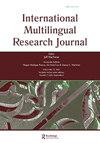Language diversity as resource or as problem? Educator discourses and language policy at high schools in the Netherlands
IF 2.1
1区 文学
Q2 EDUCATION & EDUCATIONAL RESEARCH
引用次数: 1
Abstract
ABSTRACT The ways in which educators talk about diversity, and specifically about linguistic diversity, reflect underlying beliefs about language in society and influence teaching practice. Semi-structured interviews with 55 high school teachers in the Netherlands were analyzed qualitatively in order to identify teachers’ discourse patterns related to the backgrounds and home languages of their students as well as language policies in the school context. The teachers struggle with the labels to categorize students with migration backgrounds, showing awareness of problematic insider-outsider labels. In terms of language diversity, deficit discourses about home languages and a monolingual focus on Dutch acquisition for immigrants highlights the prevalence of a language-as-problem orientation in decisions about language use. Language policy is focused on the development of skills in the target language, Dutch, and the promotion of a Dutch-only norm in the high schools. However, some interviewees describe the potential resource of the mother tongue in the classroom. Highlighting taken-for-granted assumptions in the discourses of Dutch teachers does not negate their best intentions in preparing their students for society. Rather it demonstrates the influence of language ideologies on teaching practice and the importance of teacher preparation and increased awareness of students’ home language resources.语言多样性是资源还是问题?荷兰高中教育者话语与语言政策
教育工作者谈论多样性,特别是语言多样性的方式,反映了社会对语言的基本信念,并影响了教学实践。对荷兰55名高中教师的半结构化访谈进行了定性分析,以确定教师的话语模式与学生的背景和家庭语言以及学校背景下的语言政策有关。教师们与标签作斗争,将有移民背景的学生分类,显示出对有问题的内部-外部标签的认识。在语言多样性方面,关于母语的不足论述和移民对荷兰语习得的单语关注突出了语言在语言使用决策中作为问题导向的普遍性。语言政策的重点是发展目标语言荷兰语的技能,并在高中推广仅限荷兰语的规范。然而,一些受访者描述了母语在课堂上的潜在资源。在荷兰教师的话语中强调想当然的假设并不能否定他们为学生做好社会准备的最佳意图。相反,它展示了语言意识形态对教学实践的影响,以及教师准备和提高学生对家庭语言资源意识的重要性。
本文章由计算机程序翻译,如有差异,请以英文原文为准。
求助全文
约1分钟内获得全文
求助全文
来源期刊
CiteScore
4.10
自引率
4.80%
发文量
19
期刊介绍:
The International Multilingual Research Journal (IMRJ) invites scholarly contributions with strong interdisciplinary perspectives to understand and promote bi/multilingualism, bi/multi-literacy, and linguistic democracy. The journal’s focus is on these topics as related to languages other than English as well as dialectal variations of English. It has three thematic emphases: the intersection of language and culture, the dialectics of the local and global, and comparative models within and across contexts. IMRJ is committed to promoting equity, access, and social justice in education, and to offering accessible research and policy analyses to better inform scholars, educators, students, and policy makers. IMRJ is particularly interested in scholarship grounded in interdisciplinary frameworks that offer insights from linguistics, applied linguistics, education, globalization and immigration studies, cultural psychology, linguistic and psychological anthropology, sociolinguistics, literacy studies, post-colonial studies, critical race theory, and critical theory and pedagogy. It seeks theoretical and empirical scholarship with implications for research, policy, and practice. Submissions of research articles based on quantitative, qualitative, and mixed methods are encouraged. The journal includes book reviews and two occasional sections: Perspectives and Research Notes. Perspectives allows for informed debate and exchanges on current issues and hot topics related to bi/multilingualism, bi/multi-literacy, and linguistic democracy from research, practice, and policy perspectives. Research Notes are shorter submissions that provide updates on major research projects and trends in the field.

 求助内容:
求助内容: 应助结果提醒方式:
应助结果提醒方式:


